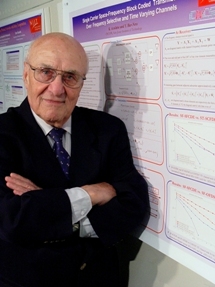Mar 8 2013
Two new patents to improve orthogonal space time codes and decode data transmissions of space time spreading were recently awarded to NJIT Distinguished Professor Yeheskel Bar-Ness, executive director of the Elisha Yegal Bar-Ness Center for Wireless Communications and Signal Processing Research. Co-inventors with Bar-Ness on both patents were NJIT alums Amir Laufer and Kodzovi Acolatse.
 NJIT Distinguished Professor Yeheskel Bar-Ness
NJIT Distinguished Professor Yeheskel Bar-Ness
"Method and Apparatus for Improving Transmission with Orthogonal Space Time Codes," (US Patent # 8.379.746) was awarded Feb.19 2013 to Bar-Ness and Laufer. "Modern wireless communication systems utilize multiple antennas for transmitting and receiving the data," said Bar-Ness. "A simple, yet powerful coding scheme for such systems is orthogonal space time coding. This invention involves a novel method for the transmission and the decoding of such codes resulting in better utilization of the channel, i.e., transmission with higher data rate along with lower error rate."
"Decoding Data Transmitted Space-Time Spreading in a Wireless Communication System Implementation and Performance Analysis of Space Time Spreading DS-CDMA System," (US Patent # 8.355426) was awarded Jan. 15 2013 to Bar-Ness and Acolatse.
Bar-Ness, a prominent expert in wireless communications and signal processing, has worked for four decades to advance the field of electrical and computer engineering. Bar-Ness, who still directs the Center for Wireless Communications and Signal Processing Research, has worked with industry, government and other universities to improve many aspects of wireless technology.
An especially notable achievement of the Center is the set of algorithms developed by its researchers. The algorithms have become industry standards, used to facilitate so-called code division multiple access (CDMA), a widely-used digital cell phone technology. Faculty affiliated with the center--the backbone of communications research in the department of electrical and computer engineering at NJIT for two decades--have received funding for projects from the National Science Foundation, the U.S. Army and Air Force and companies that include AT&T, ITT, InterDigital, Nokia, Mitsubishi, Panasonic, Samsung and Telcordia.
Both Laufer and Acolatse received doctorates in electrical engineering from the Department of Electrical and Computer Engineering at Newark College of Engineering in 2011 and 2010, respectively. Laufer is now a senior DSP Algorithms Engineer for Intel Israel at its development center in Jerusalem. Acolatse is a patent examiner at the US Patent and Trademark Office in Washington, DC.